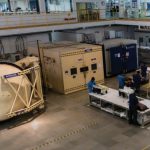Glossary
MES
Manufacturing Execution System (MES) is an automated system used in manufacturing, to track and document the production process on the factory floor – from raw materials to finished goods. It provides full execution control, management and monitoring of factory-floor production and logistic processes. The data can be added manually or collected automatically/directly from machinery, test equipment, robots, or assembly cells to bring real-time data into the production floor. MES might be seen as an intermediate step between, on the one hand, an enterprise resource planning (ERP) system, and a supervisory control and data acquisition (SCADA) or process control system on the other. MES provides data, reports and dashboards to help decision makers on the production floor to understand trends and how operations can be optimized.
What is a Manufacturing Execution System (MES)?
A Manufacturing Execution System (MES) is a software system that provides real-time visibility and control over manufacturing operations. MES collects data from various sources, including machines, sensors, and operators, and provides real-time information on production status, quality, and other key metrics. MES software is used to manage and optimize all aspects of the production process, from planning and scheduling to execution and analysis.
Why is MES Important For Your Factory?
MES is important for manufacturing companies because it helps them to improve efficiency, reduce costs, and increase profitability. MES software provides real-time information on production processes, enabling companies to identify and resolve issues quickly, optimize production schedules, and improve overall performance. MES solutions also help manufacturers to reduce waste, improve quality, and increase customer satisfaction.
Key Functions of a Manufacturing Execution System in Production MES software performs a wide range of functions to support manufacturing operations. Some of the key functions of a Manufacturing Execution System in Production include:
Production planning and scheduling: MES software helps companies to plan and schedule production processes, taking into account factors such as machine availability, labor requirements, and materials.
Shop floor control: MES solutions provide real-time information on production processes, enabling companies to monitor and control production operations.
Quality management: MES software helps manufacturers to ensure product quality by providing real-time quality data, tracking and analyzing quality metrics, and enabling companies to take corrective actions when necessary.
Inventory management: MES solutions help companies to manage inventory levels, track materials and finished goods, and optimize inventory usage.
Maintenance management: MES software helps companies to manage equipment maintenance schedules, track maintenance data, and perform predictive maintenance to prevent downtime and improve equipment reliability.
Benefits of Manufacturing Execution Systems
There are many benefits of using MES software in manufacturing operations. Some of the key benefits of Manufacturing Execution Systems include:
Improved efficiency: MES solutions help companies to improve efficiency by optimizing production schedules, reducing waste, and streamlining production processes.
Cost savings: MES software helps manufacturers to reduce costs by improving equipment utilization, reducing downtime, and optimizing inventory usage.
Increased productivity: MES solutions provide real-time information on production processes, enabling companies to identify and resolve issues quickly and optimize production performance.
Improved quality: MES software helps companies to ensure product quality by providing real-time quality data, tracking quality metrics, and enabling companies to take corrective actions when necessary.
Enhanced customer satisfaction: MES solutions help companies to deliver products that meet customer expectations by improving quality, reducing lead times, and ensuring on-time delivery.
MES vs ERP
MES (Manufacturing Execution System) and ERP (Enterprise Resource Planning) systems are both used in manufacturing operations, but they serve different functions. MES software is focused on managing and optimizing production processes, while ERP systems are focused on managing and optimizing business processes.
MES software is designed to monitor and control the manufacturing process, from production planning and scheduling to quality control and shop floor management. MES solutions provide real-time information on production processes, enabling manufacturers to identify and resolve issues quickly, optimize production schedules, and improve overall performance. MES software is typically used to manage and optimize production operations within a single factory or plant.
On the other hand, ERP systems are designed to manage and optimize business processes across multiple functions and locations. ERP software typically includes modules for finance, accounting, human resources, supply chain management, and other business functions. ERP systems provide a centralized view of business operations, enabling companies to manage resources more effectively, improve collaboration, and increase efficiency.
One of the key differences between MES and ERP systems is their focus. MES software is designed to optimize production processes, while ERP systems are designed to optimize business processes. MES solutions provide real-time information on production processes, while ERP systems provide historical data on business processes. MES software is typically used at the operational level, while ERP systems are used at the strategic level.
Another key difference between MES and ERP systems is their scope. MES solutions are typically used to manage and optimize production operations within a single factory or plant, while ERP systems are used to manage and optimize business operations across multiple locations and functions. MES software is often integrated with other production systems, such as SCADA (Supervisory Control and Data Acquisition) and PLC (Programmable Logic Controller) systems, while ERP systems are integrated with other business systems, such as CRM (Customer Relationship Management) and SCM (Supply Chain Management) systems.
In summary, MES and ERP systems serve different functions in manufacturing operations. MES software is focused on managing and optimizing production processes, while ERP systems are focused on managing and optimizing business processes. MES solutions provide real-time information on production processes, while ERP systems provide historical data on business processes. MES software is typically used to manage and optimize production operations within a single factory or plant, while ERP systems are used to manage and optimize business operations across multiple locations and functions.
Learn more
Proactive Intelligence In Manufacturing






